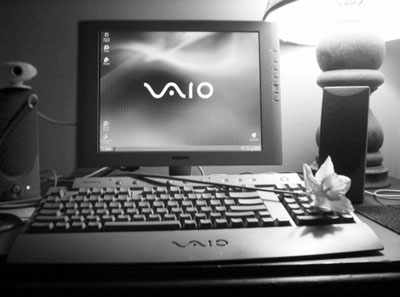All Nonfiction
- Bullying
- Books
- Academic
- Author Interviews
- Celebrity interviews
- College Articles
- College Essays
- Educator of the Year
- Heroes
- Interviews
- Memoir
- Personal Experience
- Sports
- Travel & Culture
All Opinions
- Bullying
- Current Events / Politics
- Discrimination
- Drugs / Alcohol / Smoking
- Entertainment / Celebrities
- Environment
- Love / Relationships
- Movies / Music / TV
- Pop Culture / Trends
- School / College
- Social Issues / Civics
- Spirituality / Religion
- Sports / Hobbies
All Hot Topics
- Bullying
- Community Service
- Environment
- Health
- Letters to the Editor
- Pride & Prejudice
- What Matters
- Back
Summer Guide
- Program Links
- Program Reviews
- Back
College Guide
- College Links
- College Reviews
- College Essays
- College Articles
- Back
Frozen Yogurt, Penicillin, and the Death of Biology
The periodic table clock at the end of the hallway strikes magnesium (atomic number 12), and the froyo joint across the street finally dims its flickering neon sign. Surprisingly, the basement of MIT’s Stata Hall remains abuzz with activity. Behind heavy metal doors with captivating designations of Bio-Safety Level Three and Caution: Radioactive, fluorescent lights burn despite the late hour. However, the snapshot of MIT’s biology department revealed by each tiny Plexiglas window fails to include the stereotypical safety-goggled scientists of the past mixing colorful chemicals or hiding behind microscope eyepieces. Instead, each room contains t-shirted men and women precariously balancing their last frozen yogurt of the night over a dusty keyboard, the sound of typing partially obscured by the whir of machinery.
The days of hands-on science are quickly becoming obsolete; today, it’s far more common to find a biologist pouring heart and soul into a computer program than pouring broth into an Erlenmeyer flask. Hundreds of years from now, zealous science history students may uncover a fossilized pipette and Petri dish buried beneath mounds of spare computer parts in a laboratory basement and laugh at today’s outdated procedures. But just as archaeologists view Lucy, our most famous fossil ancestor, with equal parts arrogance and perplexity, the world may never understand the importance of biological researchers until they’re extinct. Technological advancements, often considered giant strides in research, are undermining the true significance of biological science.
Technology has already revolutionized practically every aspect of our lives. Computers can direct us instantly to the nearest mall, beat us at chess or Jeopardy, and—in the case of Siri, the iPhone’s new voice command system—hold a relatively realistic conversation. In biology, advanced computer systems have sequenced and mapped the 25,000 genes of the human genome as well as the DNA of 300,000-year-old Neanderthals. New machines and equipment fulfill two main laboratory goals: precision and efficiency. With each new computer program and automated device developed, laboratories become seemingly more productive. Samples are analyzed more quickly, databases grow exponentially each day, and experiments run at triple speed—feats that supporters use to justify the exorbitant costs associated with much of the new laboratory equipment. Why pay a lab technician to pipette samples and separate liquids when there are machines that can work faster and more effectively?
Unfortunately, biology has always been a science built on accidental observation, the antithesis of the hardwired accuracy of technology. Dr. Alexander Fleming, a bacteriologist at a British hospital, did a hasty cleanup of some contaminated bacteria cultures before leaving for a weeklong vacation at his country house. When he returned, he noticed a blue-green mold on one of the long-unattended dishes that appeared to have killed the previously present bacteria. Fleming had just discovered the significance of the Penicillum mold, which produces an antibacterial agent now known as penicillin. Even far less momentous discoveries relied on a fortunate stroke of serendipity. Silly Putty was created unwittingly by a General Electric scientist experimenting with artificial rubber substitutes for the war effort. Cyclamate, aspartame, and saccharin, three artificial sweeteners found in the frozen yogurt enjoyed by many late-night scientists, were unintended byproducts of medical and industrial research. Until computers gain the ability to think creatively and adapt to new information, technology will never replace the inquisitive minds of biologists.
New data are being produced at an unprecedented rate, yet technology’s depersonalization of the brains behind the numbers further undermines biology’s importance in the public eye. How many Americans can name last year’s Nobel Prize winner in medicine? In fact, how many Americans can name a famous biologist aside from the prolific (but deceased) Charles Darwin, Gregor Mendel, James Watson, and Francis Crick? Now, more and more potential scientific celebrities are hidden behind computer screens. Any last semblance of significance that biology had to the public in the nineteenth and twentieth centuries has been conceded to geniuses like Lady Gaga, Tim Tebow, Brad Pitt, and Rebecca Black.
As C.P. Snow, an English physicist, said in his 1959 lecture The Two Cultures: “Technology... is a queer thing. It brings you great gifts with one hand, and it stabs you in the back with the other.” While new computers, programs, and equipment have provided for groundbreaking discoveries, a code or a machine can never replicate the fortuitous observations that exemplify the true essence of biological research. A few accidental late-night frozen yogurt spills on expensive computer screens might be just the achievement biology needs to survive.

Similar Articles
JOIN THE DISCUSSION
This article has 0 comments.
